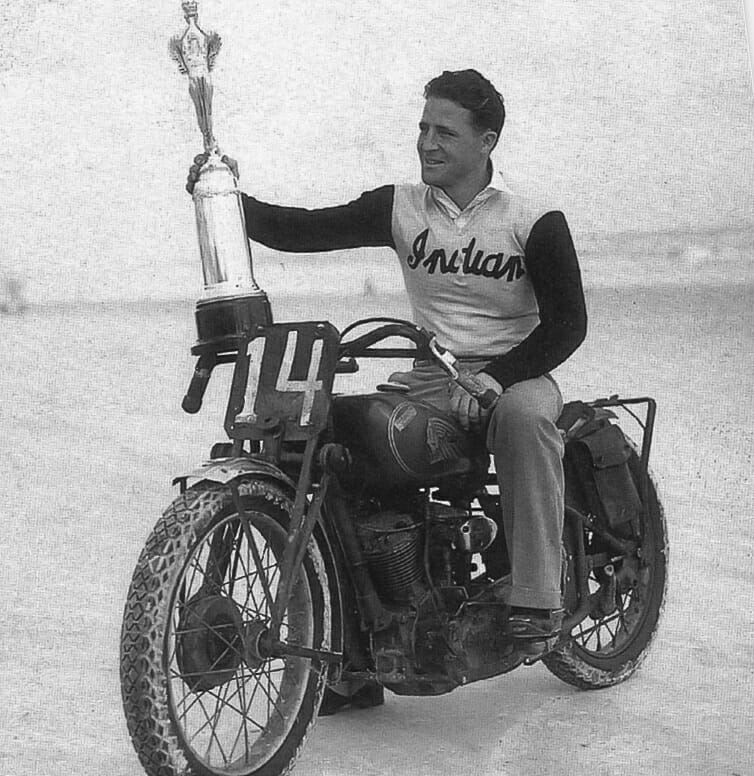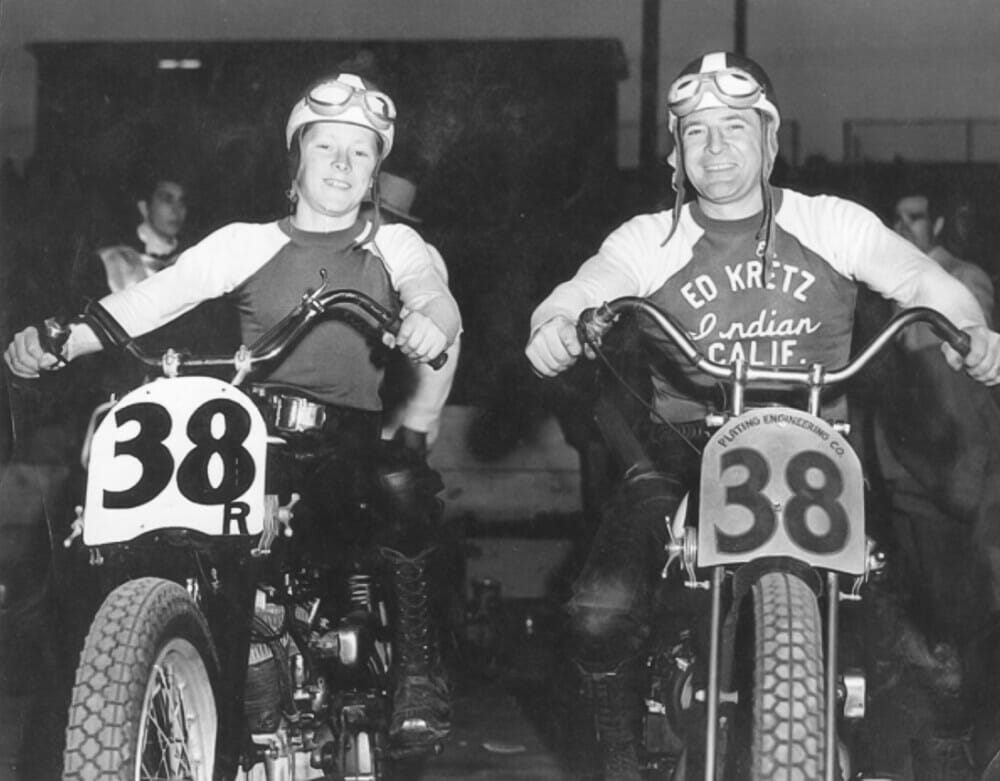Larry Lawrence | March 6, 2022
Cycle News Archives
COLUMN
This Cycle News Archives Column is reprinted from the September 2, 2009 issue. CN has hundreds of past Archives columns in our files, too many destined to be archives themselves. So, to prevent that from happening, in the future, we will be revisiting past Archives articles while still planning to keep fresh ones coming down the road -Editor.
Iron Man Kretz
Ed “Iron Man” Kretz was undoubtedly the greatest motorcycle racer of his day and the first major star of AMA Class C racing. Among his considerable accomplishments were victories at nearly all of the major national events of the late 1930s and 1940s, including the Savannah 200-mile road race, the inaugural Daytona 200 in 1937, the Langhorne 100 Mile, and the Laconia Classic. Only one major race eluded Kretz over the years—the Springfield Mile. Kretz was considered in such high regard that many of the old-time racers from the teens and ’20s called Kretz the best they’d ever seen, a sentiment many of Kretz’s contemporaries also shared.
 Ed “Iron Man” Kretz after winning the first Daytona 200 in 1937.
Ed “Iron Man” Kretz after winning the first Daytona 200 in 1937.
Photos Courtesy AMA Motorcycle Hall of Fame
Kretz was born September 24, 1911, in San Diego. Unlike many top motorcycle racers who often began riding at a young age, Kretz didn’t start riding until he was 20. According to his son Ed Jr., it was out of necessity. In the middle of the Depression, a motorcycle was the only form of transportation that Kretz Sr. could afford. Ed Jr. said he remembered times when he, his mom and dad all loaded onto their well-worn Harley-Davidson to go somewhere.
Kretz was driving a truck transporting produce from the farms of the Imperial Valley to Los Angeles when he began attending Southern California motorcycle field meets as a spectator. He entered some races, and, despite his inferior equipment, he quickly became one of the area’s top riders. Kretz stood at 5-foot-8 but was a muscular 185 pounds. He used his strength to ride in a style that was described by many as bullying his bike around the track. One fellow competitor named Bill Cummings said that Kretz, “…didn’t ride the corners, he straightened them out.”
Floyd Clymer, who was promoting many of the races in which Kretz competed, saw Kretz’s raw talent and got him a new Indian to race. With the new machine, Kretz began winning Southern California races on a regular basis.
Kretz’s big breakthrough win came at the 1936 200-mile road-race National Championship in Savannah, Georgia, where he beat the best riders from across the nation. Kretz was suddenly one of the best-known racers in the country. He was given a contract with Indian that paid him $200 per month (a princely sum during the Depression), as well as travel and expense money.
The ride that Kretz will forever be remembered for was his victory in the inaugural Daytona 200 in 1937. Even in its first year, the Daytona 200 was one of the most important races on the calendar. It would go on to become the single most important motorcycle race in America, and Kretz’s win at the very first race earned him a significant place in the history of the sport.
Kretz fell twice at Daytona that year coming out of the south turn, but both times he was able to pick up his Indian and get back on the gas. By the time starter Jim Davis waved the checkered flag, Kretz had lapped the entire 86-rider field. It was one of the most dominating performances in the history of the 200.
“He was such a determined rider,” Davis said, himself a racing star of the 1910s and ’20s. “He didn’t hold back at all. He’d tell you before a race, ‘Stay out of my way or I’ll run over you.’ And most people believed him.”
Kretz was the favorite at many Daytona 200 races in the years to follow, but he was never able to win the race again, despite often leading. In 14 other races at Daytona, Kretz had nothing but tough luck, primarily mechanical failures with his Indians and, later, Triumphs. Kretz continued to race in the 200 until he was 47 years old in 1959. For years he held the record for running the most miles in the 200.
Kretz went on to dominate the famous Langhorne, Pennsylvania, 100-mile dirt-track race, winning that race three times before World War II and once more in 1948. He also won the popular road race at Laconia, New Hampshire, before and after the war.
At times, Kretz and his Indian were so dominant that competitors, especially those backed by Harley-Davidson, went to great lengths to try to see Kretz wasn’t his best on race day. In the motorcycle-racing documentary called “Glory Days,” Kretz was interviewed, and he talked about local Harley dealers who would often invite Kretz to big parties the night before a national and make sure he had plenty to drink, hoping he’d be a little hungover the next day, but there was no chance. After all, they didn’t call Kretz the “Iron Man” for no reason.
 Ed Kretz Jr. (left) and Ed Kretz Sr. (right) in 1948.
Ed Kretz Jr. (left) and Ed Kretz Sr. (right) in 1948.
During World War II, Kretz served as a motorcycle-troop instructor, teaching new recruits how to ride and maintain Indian war mounts. Often the troops, knowing that Kretz was a famous racer, would talk him into giving them an exhibition of his skills. It didn’t take much prodding—Kretz would gladly oblige the troops with a few hot laps of broad-sliding around a make-shift dirt oval.
By the time he retired from racing in 1959, Kretz had earned nine AMA national wins as well as numerous Pacific Coast titles. He richly deserved the title of Iron Man by virtue of his longevity in a young man’s sport. He was also voted the AMA’s Most Popular Rider in 1938 and again in 1948. During the 1950s, Kretz’s son Ed Jr. joined him on the national circuit and became a rider of some repute, bolstering the fame of the Kretz name even further.
After the war, Kretz opened a motorcycle dealership, which he ran until he retired in 1986. After retiring, he made frequent popular appearances at vintage motorcycle meets across the country. At the 50th running of the Daytona 200 in March of 1991, Kretz was the guest of honor and took a lap on the Indian he won the race on in 1937. Kretz said that TT racing was his favorite form of racing and called the Laconia, New Hampshire, circuit his favorite. He called Babe Tancrede and Ben Campanale two of his best friends even though they were his archrivals on the track.
Kretz passed away in January of 1996. He was 83. Shortly after Kretz’ passing, national TV host Jay Leno made a generous donation to the Motorcycle Hall of Fame in Kretz’s honor. Kretz left a legacy as the first big star of Class C racing. He was inducted posthumously into the AMA Motorcycle Hall of Fame in 1998. CN